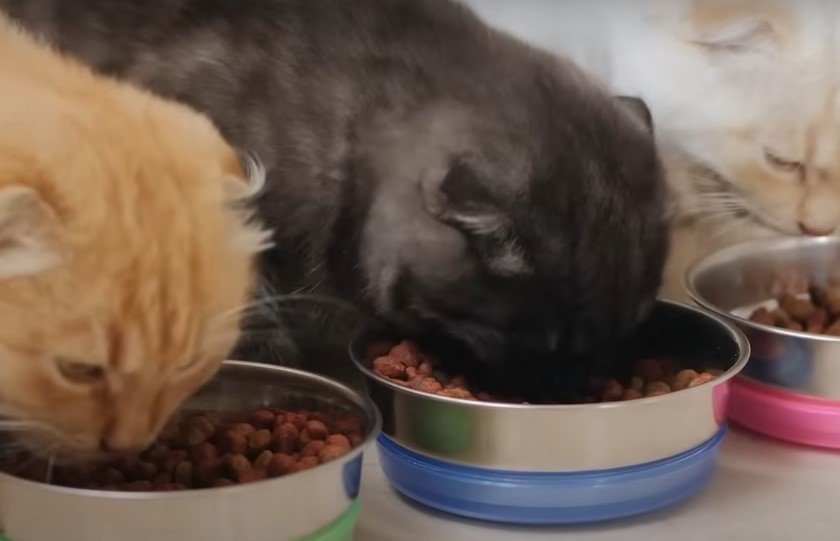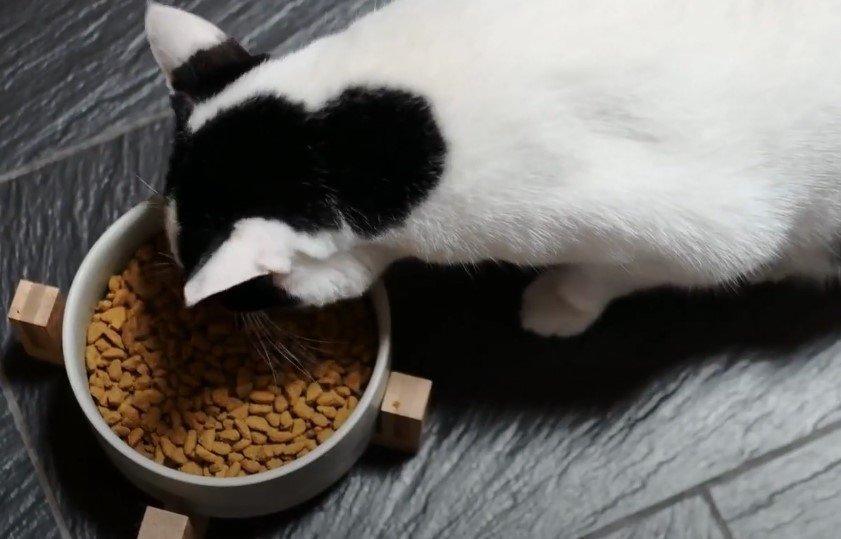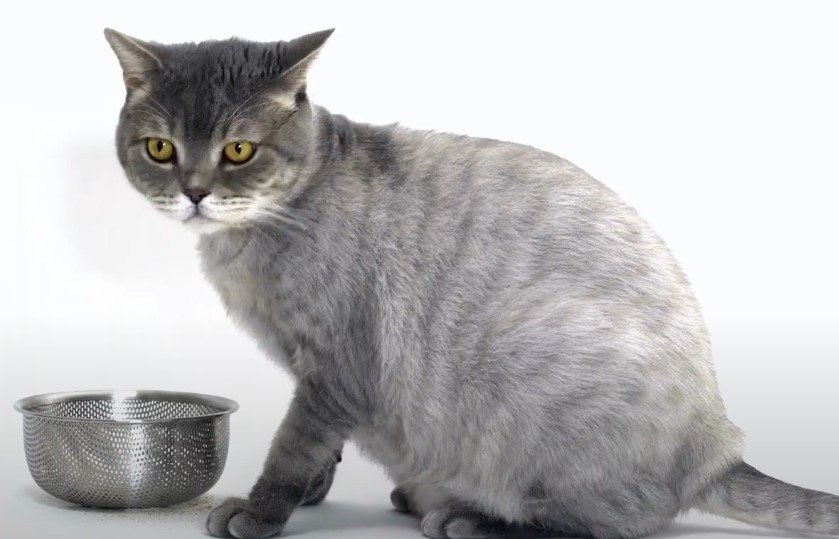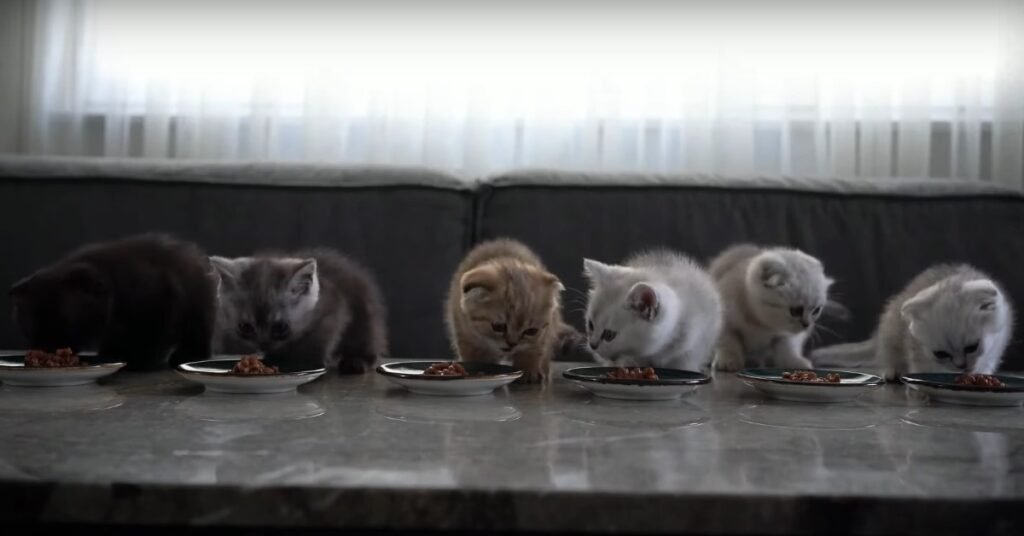
Choosing the right food for your cat depends on its age and nutritional needs. Is it different when it comes to kitten food vs senior cat food? The answer is yes!
Kittens need high-energy, nutrient-rich food to grow strong, while older cats require balanced diets that support joint health and digestion.
But what is the difference between kitten food and senior cat food? If you don’t know, don’t worry! Here, I’ll break down the differences so that you can make the best choice for your feline friend.
Kitten Food vs Senior Cat Food
Carbohydrates
Kitten food typically contains less than 10% carbohydrates on a dry matter basis, as kittens need more protein and fat for energy. However, not all kitten foods follow this pattern; many commercial brands, especially dry foods, may have higher carbohydrate levels.
Senior cats are obligate carnivores, so they need very few carbohydrates—less than 10% of their daily calories. Too many carbohydrates can cause weight gain or digestive issues. To keep them healthy, focus on protein-rich, low-carb food.
Protein Levels
Protein is essential for muscle development in kittens. Kitten food contains higher protein levels. Kitten food usually has at least 30% protein on a dry matter basis. Some brands offer 35% or more.
According to AAFCO (Association of American Feed Control Officials), kitten food should contain at least 30% protein. FEDIAF (European Pet Food Industry Federation) sets the minimum at 28g per 100g DM.
As cats age, they experience muscle loss (sarcopenia) and slow digestion. Therefore, high-quality protein is essential for senior cats. Veterinary nutritionists recommend 35-45% protein on a dry matter basis in cat food. Cats aged 12 years or older should eat around 50% protein. Higher protein (40% +) is essential for underweight or very active senior cats.
Ensure the protein comes from high-quality animal sources like chicken, fish, or turkey instead of plant-based protein, which is harder for senior cats to digest.
Fat Content
Fats provide energy and support growth in kittens. Kitten food usually contains 12% to 24% fat, which is more than the fat in adult and senior cat food.
For senior cats, the recommended fat content in their diet is typically 10-15% on a dry matter basis.
However, this can vary depending on the cat’s health, activity level, and specific needs. Underweight or very active senior cats may need up to 20% protein, while overweight or less active cats may need around 10%.
Fish oil (rich in Omega-3s for joints and brain health), Chicken fat (easily digestible and flavorful), and Flaxseed oil (a plant-based Omega-6 source for skin & coat health) are the best fat sources for senior cats.
Calcium and Phosphorus
Kittens need extra calcium and phosphorus for strong and healthy bone growth. Kitten food typically contains around 2.5 grams of calcium and 2.10 grams of phosphorus per 1,000 calories of food.
Calcium and phosphorus are essential minerals for bone health, muscle function, and overall metabolism in senior cats. However, imbalanced levels can lead to kidney disease and bone loss.
Generally, Senior cats require 0.5% to 1% calcium and 0.3% to 0.8% phosphorus on a dry matter basis. A calcium-to-phosphorus ratio of 1.2:1 is usually recommended.
Older cats, especially those with chronic kidney disease (CKD), need low-phosphorus diets to reduce kidney strain. A phosphorus level below 0.6% (dry matter) is ideal for cats with early-stage kidney issues.
Look for senior cat foods labeled as “kidney-friendly” or with controlled phosphorus levels if your cat has kidney concerns.
Omega-3 and Omega-6 Fatty Acids
Kitten food contains omega-3 fatty acids. Omega-3 fatty acids help brain development in kittens. Omega-6 fatty acids support a kitten’s growth by promoting healthy skin, a shiny coat, and a strong immune system. They also aid in cell development, muscle growth, and energy production, ensuring overall health and vitality.
Omega-3 and Omega-6 fatty acids play a vital role in a senior cat’s health. Omega-3 helps reduce inflammation, easing arthritis pain and supporting joint health. It also boosts brain function, helping slow age-related cognitive decline. Additionally, it promotes heart health and improves skin and coat condition by reducing dryness and shedding.
Omega-6 is essential for maintaining healthy skin and a shiny coat. It also strengthens the immune system, helping the body fight infections. Moreover, it supports cell growth and repair, which is crucial for overall well-being.

Fiber Content
Kitten food has slightly more fiber than adult and senior cat food. AAFCO (Association of American Feed Control Officials) recommends that kitten food should contain at least 4.5% fiber. Kittens have developing digestive systems and need balanced fiber for good digestion.
Senior cats typically need 2-6% fiber on a dry matter basis to support digestion, prevent constipation, and manage weight.
Pumpkin, sweet potato, oats, beet pulp, psyllium husk, and cellulose are the best fiber sources for cats.
Avoid too much fiber (above 8%), as cats are obligate carnivores and don’t need excessive plant-based ingredients.
Moisture Content
Both kittens and senior cats benefit from proper hydration. Wet foods provide higher moisture content, aiding in hydration. Kitten food usually contains around 75-80% moisture in wet food and 10-12% moisture in dry food.
Senior cats need high-moisture diets to stay hydrated, maintain kidney health, and support digestion. Ideally, senior cat food contains 70-80% moisture in wet food and 8-12% moisture in dry food.
Senior cats should consume about 50-60 mL of water per kilogram of body weight per day. For example, a 4 kg (8.8 lb) senior cat needs approximately 240-280 mL of water daily.
Feed wet food as the main diet since dry food has low moisture and requires extra water intake.
Vitamins and Minerals
Kitten food should have vitamins A, B, D, E, and K, as well as calcium, phosphorus, and DHA. Vitamin A supports immunity and eyesight. Too much vitamin A can be harmful to health.
Senior cats require some essential vitamins such as vitamin A, B-complex (B1, B6, and B12), D, E, K, C, and taurine.
Vitamin A supports vision, immunity, and skin health. B-complex vitamins boost energy, nerve function, and appetite. Vitamin D strengthens bones and muscles by regulating calcium absorption. Vitamin E protects cells, supports brain function, and eases arthritis. Vitamin K helps bone health and blood clotting. Taurine is critical for the heart, vision, and digestion. While cats naturally produce Vitamin C, additional intake can provide antioxidant benefits and support immune function. Taurine, an essential amino acid, is critical for heart health, vision, and proper digestion.
Age-Specific Ingredients
Kitten food contains nutrients like DHA (Docosahexaenoic acid). DHA is important for kittens because it supports brain and eye development. It also plays a key role in cognitive function and the nervous system.
Senior cat food contains glucosamine & chondroitin to reduce arthritis. Controlled phosphorus supports kidney function, while probiotics aid digestion. L-carnitine helps manage weight, and antioxidants boost immunity and cognitive health. High moisture content prevents dehydration and urinary issues.
Digestion
Kittens have sensitive digestive systems. Kitten food is formulated for easy digestion. Since kittens have developing digestive systems, they need easily digestible food with balanced fiber for gut health.
Senior cats often have sensitive digestion, so their food contains easy-to-digest ingredients such as easily digestible protein, lower fat (to reduce digestive strain), and probiotics and fiber (to aid gut function and prevent constipation).

Dehydration Concerns
Kittens are prone to dehydration due to their high activity levels. Proper hydration is essential for digestion, circulation, and overall health. Signs of dehydration include dry gums, lethargy, sunken eyes, and reduced skin elasticity.
To treat dehydration in a senior cat, provide high-moisture wet food and fresh water. Use a cat fountain and add low-sodium bone broth or water to dry food to boost hydration. In severe cases, subcutaneous or IV fluids may be necessary. Look for signs like lethargy, dry gums, or loose skin, and consult a vet if needed.
Taste Preferences
Kittens are usually less picky and more willing to try new foods. Their taste develops over time, and early exposure to different textures and flavors can shape their long-term food preferences. However, they naturally prefer high-protein, high-fat foods with strong aromas. Providing a mix of wet and dry food can help kittens adjust to different diets and ensure balanced nutrition.
Senior cats often develop picky eating habits due to aging senses, dental issues, or health changes. They prefer strong aromas, soft textures, and high-moisture foods for easier chewing and digestion. Warming food slightly enhances flavor, and adding broth or toppers boosts appeal.
What to Consider When Choosing Food for Your Cat
Here are some key factors to consider when choosing the best food:
1. Consider age and life stages when choosing the cat food. Because cats have different needs at each stage.
2. Choose food that meets AAFCO standards.
3. When choosing wet food vs dry food, consider your cat’s hydration needs, dental health, and personal preference. Wet food has high moisture. On the other hand, dry food has less moisture.
Tips: A mix of both can provide balanced nutrition.
4. Look for food designed for specific health conditions if your cat has allergies, kidney disease, obesity, or diabetes.
5. Choose food with real meat as the main ingredient and avoid artificial additives, preservatives, and fillers.
6. Look for added fiber and prebiotics because easily digestible food prevents stomach issues.
7. Cats have different food preferences, so try various textures and flavors to find what they enjoy.
How to Transition Your Cat to New Food
A cat’s nutritional needs change as it grows. Kittens, adult cats, pregnant cats, and older cats need different food. As a cat ages, its food should change. Start with kitten food, then switch to adult food, and finally choose senior food when your cat ages.
Introduce new cat food to your cat slowly over 7 to 10 days. A quick change can cause digestive issues. Follow this gradual process to ensure a smooth transition:
- Day 1-2: Serve 3/4 of the current food and add 1/4 of the new cat food.
- Day 3-4: Feed half the new food and half the current food.
- Day 5-6: Serve 3/4 of the new food with 1/4 of the previous food.
- Days 7-10: Feed only the new food.
Can Older Cats Eat Kitten Food?
Yes, senior cats can eat kitten food, but it’s not the best choice for a long time. Kitten food is rich in calories, fat, and protein, which may lead to weight gain.
It can help underweight or recovering cats, but it isn’t suitable for daily feeding. Senior cats need a balanced diet that supports their joints, digestion, and overall health.

Can Kittens Eat Senior Cat Food?
No, kittens should not eat senior cat food. Senior food lacks the high protein and fat that kittens need for growth. It may also miss key nutrients like DHA for brain development.
Their bodies are still developing, so they need higher amounts of protein, fat, and essential nutrients like DHA, calcium, phosphorus, fiber, and vitamins (A, B, D, E, K). Senior cat food could affect their health and growth.
With this guide, you can choose the right food for your cat’s age, ensuring balanced nutrition and overall health. Providing age-appropriate nutrition helps your cat stay healthy, active, and happy.
FAQs on Kitten Food vs Senior Cat Food
1. Is senior cat food easier to digest than kitten food?
Yes, senior cat food often contains more fiber and easily digestible ingredients to support aging digestion. It may also have added probiotics for gut health.
2. When should I switch from kitten food to adult or senior cat food?
Kittens should switch to adult cat food at around 12 months old. Senior cats, usually 7 years or older, need senior cat food with nutrients that support their joints and digestion.
3. Is adult cat food too rich for kittens?
Yes, adult cat food is not suitable for kittens. It does not contain enough protein, fat, and essential nutrients for kittens. Kittens should eat specially formulated kitten food until they reach 12 months old.
4. Does senior cat food have less calories?
Yes, senior cat food usually has fewer calories. Older cats are less active, so they need fewer calories to avoid weight gain.

